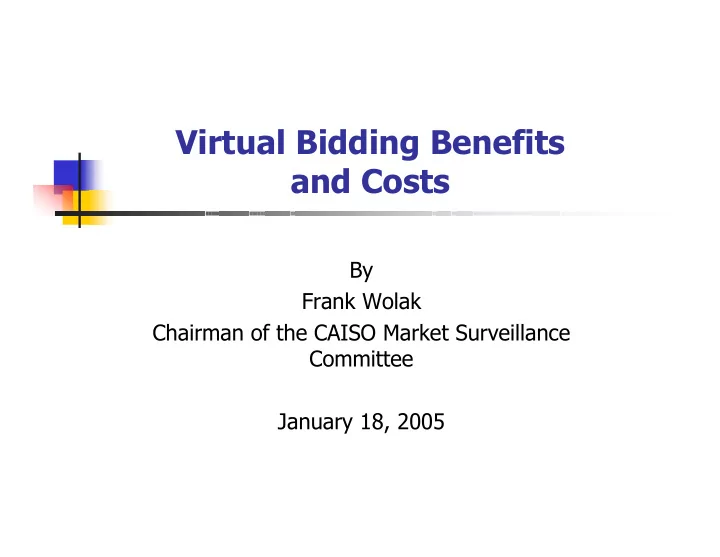

Virtual Bidding Benefits and Costs By Frank Wolak Chairman of the CAISO Market Surveillance Committee January 18, 2005
What is Virtual Bidding? Willingness to buy or sell energy in day-ahead market with opposite � transaction in real-time market mandated 50 MWh purchase in day-ahead market with 50 MWh sale in real-time market � Purely financial transaction to exploit difference between day-ahead and real-time � prices If market participant believes real-time price will be higher than day- � ahead price, should buy day-ahead energy and sell it in real-time Increased day-ahead demand drives up day-ahead price � Increased real-time supply pushes down real-time price � Actions of virtual bidders cause day-ahead and real-time prices to � equal one another on average Eliminates predictable differences in real-time and day-ahead prices � 2 \MSC\fwolak MSC Meeting, 1/18/2005
Benefits of Virtual Bidding Provides strong incentives for day-ahead and real-time prices at all locations where virtual � bidding is permitted to equal one another in expectation Does not require suppliers to alter how they operate their units in order to sell output in real-time � market despite scheduling in day-ahead market Suppliers can focus on scheduling in least-cost manner and use virtual bidding to sell output in desired � market Similar logic applies to load scheduled by LSEs � Could require 100% of ISO’s load forecast to be scheduled against physical generation in day-ahead market � Load serving entities (LSEs) could then use virtual bids to move some of these purchases from day-ahead � to real-time market Eliminates high barriers to entry into market for exploiting day-ahead and real-time price � differences Currently only generation unit owners and LSEs can engage in “virtual bidding” � Loads can submit “incredible” price responsive demand bids to avoid buying in day-ahead market � Generation can submit “incredible” supply bids to avoid selling in day-ahead market � By eliminating this barrier to participation in “virtual bidding,” market participants need not own � generation to engage in virtual bidding Purely financial participants can increase depth of day-ahead energy market � PJM currently accepts an average of roughly 9000 MW of virtual supply and demand bids each hour � Eliminates any excessive profits generation owners and LSEs might currently earn from “virtual bidding” � 3 \MSC\fwolak MSC Meeting, 1/18/2005
Costs of Virtual Bidding Large virtual positions by a supplier or load may create incentives to � increase or decrease real-time price Supplier or LSE must still have ability to influence real-time price significantly, � which seems unlikely at current level of forward contracting in California Large virtual positions across nodes may create incentives to operate � generation units to cause congestion in real-time market Supplier or LSE must have a significant FTR position across two nodes—PJM � solution of refunding FTR revenues Most all potential costs are the result of large virtual positions by a � small number of suppliers Solution—Limits on MWhs of virtual bids within an hour or day � Many market participants, each providing a small quantity of virtual � bids, enhances market efficiency 4 \MSC\fwolak MSC Meeting, 1/18/2005
Implementation Issues � FERC has ordered CAISO to consider implementing virtual bidding at start of LMP market � Virtual bidding at all nodes versus only at trading hubs � New York ISO only allows it at zonal level � PJM allows virtual bidding at all node in network � How to set limits on MWhs of virtual bidding � How to adjust these limits over time � How to set credit requirements on virtual bidding � Suppliers and LSEs � Traders and other financial market participants 5 \MSC\fwolak MSC Meeting, 1/18/2005
Recommend
More recommend